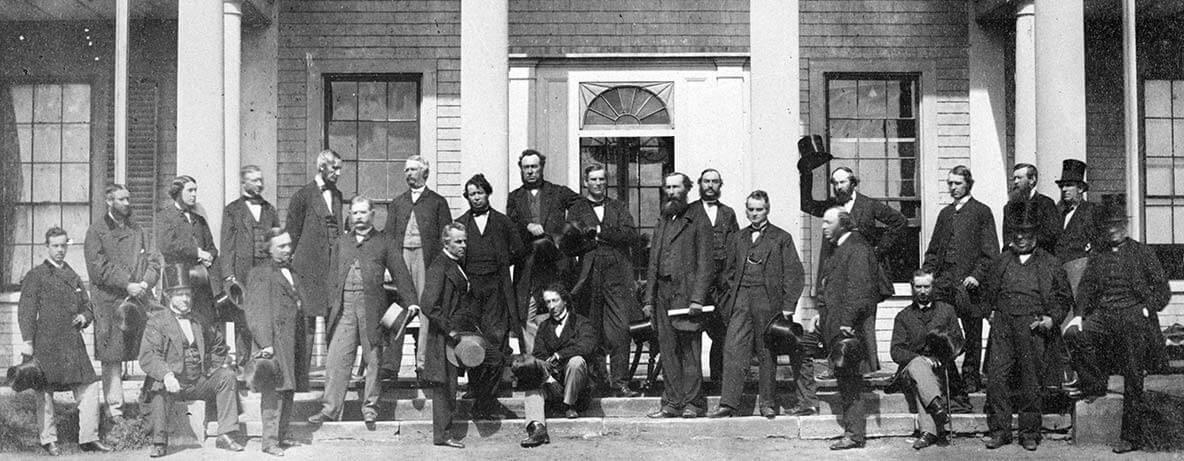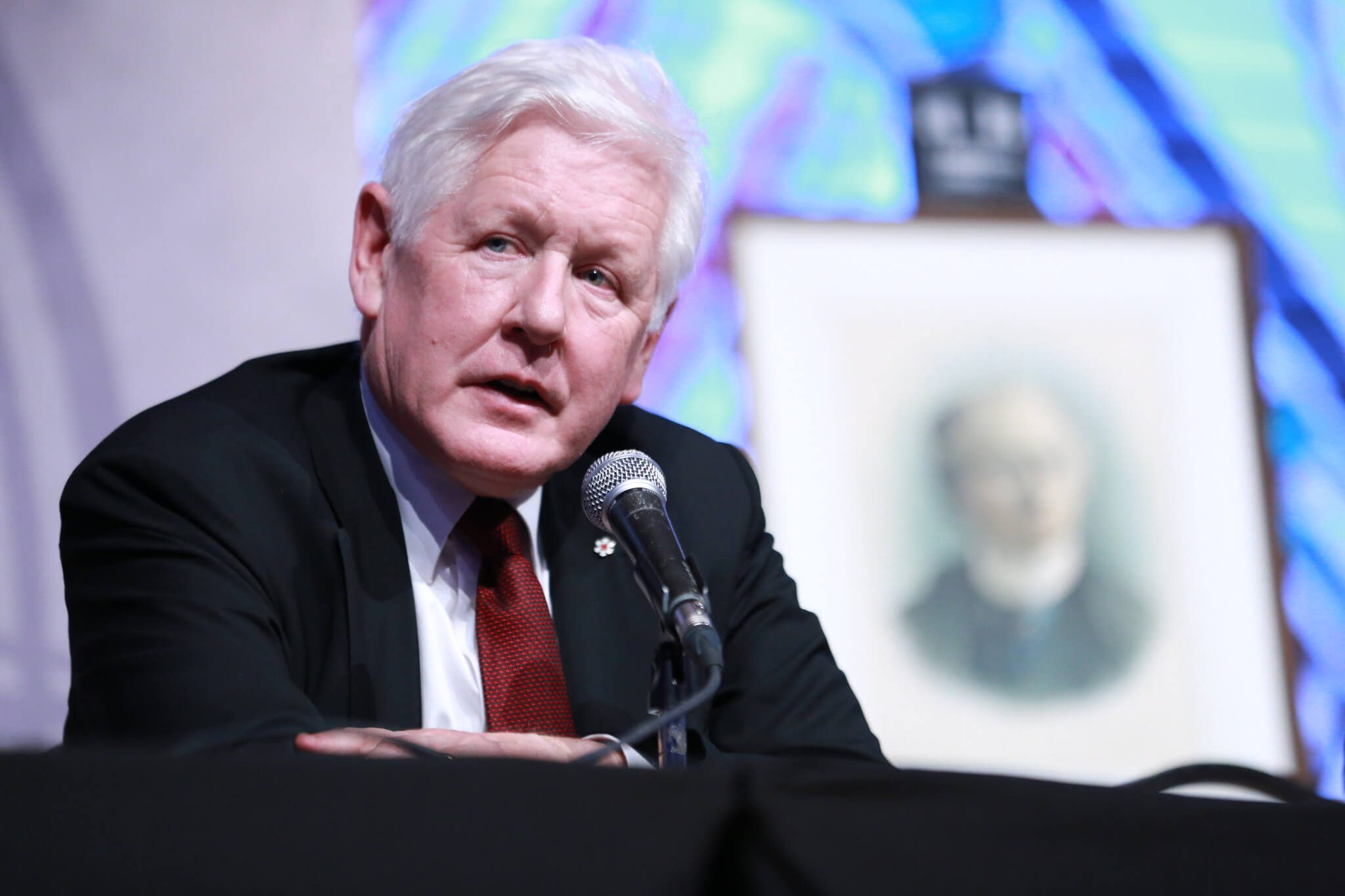[Ed. In a speech denouncing the growing “spirit of disunion” in Canada, McGee criticizes the Cartier-Macdonald government for refusing to respond to Sandfield Macdonald’s motion in support of the so-called “Double Majority principle,”[1] one of several proposals for constitutional reform. Accusing the government of accepting the Union was “on its last legs,” McGee declares his hope that the old system will “make way for a more complete and perfect union,” and “the speedy growth of this great Province into an incipient nationality.”]
Mr. McGee said that last year the hon. member for Cornwall moved a resolution almost identical with that now before the House, and that he (Mr. McGee) had felt it his duty to support it. If there had been in this session of Parliament, from the beginning of it till the present time, a valuable moment for those who professed to entertain moderate views, and to be possessed of influence in the country to make those known, and that influence felt throughout the length and breadth of the land, it was, he contended, in the very debate in which they were then engaged.
In all probability that was the last debate which would ever take place in a United Legislature sitting in the chief city of Upper Canada. He presumed that the Government intended to go for four years to Quebec, and then to remove to Ottawa, there permanently to reside – which, though situated in Upper Canada, could not be said to be so peculiarly Upper Canadian as the city of Toronto. Therefore, it was that he had said that this would be the last important debate in a United Legislature sitting in Upper Canada.
They were first of all to go to Quebec for four years; but where, he would ask, was the guarantee that the Union would last four years in the present condition of the Province? When they heard leading representatives of the people who occupied seats in that House, instituted under and by virtue of the Union, give utterance to disunion sentiments; when they heard such sentiments loudly proclaimed from one side of the House, and echoed tauntingly back from the other, and when they heard gentlemen declare “well, let a severance of the Union come – we are prepared for it,” these, he asserted, were strong symptoms and unmistakeable indications of what the feeling of both sections of the province was on that point.
If the Government believed the Union workable, or that it could be made workable, it was their most solemn duty to have rebuked such sentiments. But their very silence showed that their belief was that the present Union was not workable; that its dissolution was a mere matter of time; that it was on its last legs, and that it was either unworthy of being defended or incapable of any defence at all. Where could it have been with more propriety defended than in the chief city in Upper Canada, and in the course of a debate in which sentiments diametrically opposed to Union had been uttered?
He had no doubt in his own mind that they would find the difficulties which had distracted the Legislature during his session, as well as the last, would assume a greater degree of gravity in Quebec. And why? The hon. member for Montmorency had talked eloquently and well upon the necessity of compromise, and no man recognised the importance of that doctrine more than he (Mr. McGee) did, for the spirit of compromise was the spirit of harmony; but where was it desirable that that compromise should be made? He (Mr. McGee) would answer, on that very spot, in the chief city in Upper Canada, and in the presence of the people of Upper Canada. If the hon. gentleman was as bold a statesman as he was an advocate in that House, that was the place to settle the difficulties arising between both sections. Could it be reasonably expected that hon. members from Upper Canada, in the presence of a strange race and away from their own soil, would yield so readily to arguments and proposals of compromise? No. If the present Union was at all defensible – if it could be upheld – this was the time, this was the occasion, to prove it.
He (Mr. McGee) had lost no opportunity of making himself acquainted with the feelings of the people throughout the country, and he was convinced that he did not exaggerate when he said that there existed such a spirit of disunion in the upper section of the Province; and he would add, on the authority of members of French origin in Lower Canada too, that if this cry of disunion were raised it would be popular. Had the end of the Union then arrived? If so, let it not be announced by the outcry of the passions of people, nor yet let it be heralded by passionate debates on the part of their representatives. Let those whose duty it is to steer the ship of State direct it in the proper path, and if the evil must come let them find expedients to break the shock.
It was said in common conversation that the Home Government would never permit a dissolution of the Union. They could only reason upon that point from analogy, and nothing, he contended, was more common in their colonial history than such an event. New Brunswick and Nova Scotia were formerly one province, and had been separated by the action of the Imperial Government. Cape Breton had been separated and re-annexed to Nova Scotia, as Labrador had been to Newfoundland. This Upper Province belonged originally to the province of Quebec – was separated from it in 1791, and re-united half a century later. Judging from the colonial policy which the mother country had ever pursued, there is nothing more certain that that, if a dissolution of the Union was strongly pressed for, it would not be refused.
He spoke impartially. He had as deeply at heart, he had as great a reverence for, the religious institutions of Lower Canada as any Lower Canadian could have. And he had never sat by and heard them attacked without putting forward his decided protest against such utterances. In that respect he was certain he felt as strongly as anybody could do for the preservation of the social and religious institutions of Lower Canada, and if they were attacked – and might that day be far distant – his duty would be to unite himself heartily with those who defended their hearths and their altars. On the other hand, he had a very deep, strong, and sincere feeling of interest in the people of Upper Canada. He belonged to them by birth; he had a great deal in common with them; one third of them were emigrants like himself, and he could therefore speak impartially on the subject.
In that spirit, he would say that, badly as they got on under the present system, they would get on much worse if the Union were severed. The radical evil did not lie so much in the system as in that insatiable thirst for office which made every man believe himself a born statesman, and imagine that he should succeed to office after occupying a seat for twelve months in that House. Too many of them desired by illegitimate means to attain to wealth, to have a hand in a job, and surreptitiously to arrive at a position to the attainment of which men in other countries were willing to devote the best and the greater portion of well-spent lives. This spirit he regarded as dangerous – as the rock against which they would split if proper caution was not used. That was the spirit which would prove their ruin, and which would produce a dissolution of the Union. It would be doubly productive of evil in Quebec, as there the French Canadian influence would be stronger, and consequently the suspicions of the people of Upper Canada would be more aroused.
- CAUCON – That will strike in both ways.
- MCGEE – That is your view of sound policy. The hon. gentlemen thinks Lower Canada has now the power and will keep it.
- CAUCHON – I never said so. I hope you don’t want to misrepresent me. What I said was, that we ought not to make any concession to Upper Canada without being well aware of what we are doing.
Mr. McGee said that such grave issues as those between the two section of the Province ought not of course to be settled without mature deliberation. The hon. gentleman then went on to say that he regarded the taunts the hon. member for Montmorency had uttered that night, and in which he was encouraged by hon. gentlemen opposite, respecting the gentlemen who had been called up to form the Administration of August last, as most unjust. To suppose it possible that great questions, some of which had been fructifying and fermenting since the Union, could be settled in forty eight hours, was an absurdity.
He would not have alluded to this matter, did it not incidentally show the existence of an unfriendly desire to place public men unfairly before the House and the country – in a position in which their influence must be endangered, instead of taking them as they were, and giving them an opportunity of being useful so long and as far as possible. Instead of being treated in such a spirit, they were attacked with harshness, severity, and unfairness. So long as such a spirit existed, it showed clearly that it was not desired that they should grow into one nation; it showed that the theory – that Canada would be one nation – which existed in the mind of Lord Sydenham and his advisers, had been abandoned on both sides, and that no nearer approach could be made towards its fulfilment.
On the contrary, he was one of those who desired that if the present system were displaced, it should be only to make way for a more complete and perfect union. As one who looked forward to the speedy growth of this great Province into an incipient nationality, which, in the fullness of time, and with the consent of the parent state, was to take its place among the nations of the New World; as one who did not believe that prospect to be all a dream; as one who looked forward with confidence to that glorious consummation, he would say that it was now the solemn duty of the gentlemen who occupied the Treasury Benches to speak seriously one last parting word to Upper Canada on a question which most vitally concerned her; and, on the important occasion of bidding her adieu, show some reasonable grounds for adopting or rejecting the resolutions of the hon. member for Cornwall.
[1] This was a constitutional expedient, by which it was proposed, that as Upper and Lower Canada had an equal number of members, under the Union Act, no legislation “should be forced upon either, without the consent of its own majority.” It subsequently failed in practic



